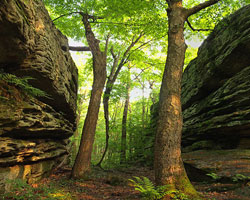The Fight to Save Forests from Fracking

Approximately 150 anti-fracking protesters shut down Marcellus shale drilling operations at a site in a Pennsylvania state forest on Sunday. The drilling site, owned by EQT, was blockaded beginning at 8 a.m. Sunday, according to Marcellus Shale Earth First!, which helped to organize the action. Protesters had arranged two tree sits and erected a barricade across a dirt road used by drillers, turning back at least one Halliburton truck.
A spokesperson for EQT told local reporters that as a result, their drilling rig was completely shut down at noon. “The safety of everyone involved is our primary concern, including employees, contractors, police officers and the protesters themselves,” EQT Corp. spokeswoman Natalie Cox said. “Therefore, operations will not resume until we are assured it is safe to do so.”
By 9 p.m. Sunday night, at least three protesters, including some involved in the tree sit, had been arrested. It was not clear whether drilling operations had resumed.
This sort of protest is not without precedent in the fight over fracking. Protesters in the U.K. shut down shale gas drilling rigs in Nov. 2011.
Protesters yesterday said they hoped to prevent further destruction of Pennsylvania’s state forests, roughly half of which have been leased for drilling. Pennsylvania has over two million acres of state forest, one of the largest reserves in the eastern U.S., and roughly three quarters of Pennsylvania’s state forest lie atop the Marcellus shale. One of Pennsylvania’s most dramatic shale gas accidents took place on private land near the Moshannon State Forest in June 2010, when a 16-hour long blowout at a well owned by EOG Resources spewed tens of thousands of gallons of wastewater into the area.
Local farmer Jenny Lisak, who says her own property has been impacted by fracking, described the reasons she supported the protest. “Having grown up enjoying Moshannon State Forest in so many ways, I am absolutely appalled at the ongoing destruction,” she said.“The once narrow and inviting oak-shaded lanes are now being replaced by dust and traffic choked roads for chemical laden trucks – there are no words to describe the injustice of taking public land, meant to provide a source of beauty and wilderness for all and turning it into an industrial zone.”
State officials predict that as many as 10,000 wells will be drilled in Pennsylvania’s state forests over the next decade. Each well pad requires clearing several acres of forest and Marcellus shale well pads tend to be double the size of those used for conventional oil and gas drilling. Drilling and fracking each well (and there are often six to ten wells drilled per pad) requires millions of gallons of water, produces millions of gallons of toxic wastewater, and requires hundreds of truckloads of sand and chemicals.
A 2010 report by the Department of Conservation and Natural Resources concluded that drilling on state lands could have a dramatic impact. “No additional leasing involving surface disturbance can occur without significantly altering the ecological integrity and wild character of our state forest system,” the report stated. Shortly afterwards, then-Governor Ed Rendell placed a moratorium on additional leasing of state park land for drilling. His successor, Tom Corbett, rescinded that policy shortly after taking office.
In nearby Ohio, a law authorizing the leasing of state lands for drilling was passed in 2011. Over 80 million acres of federal land have been leased for oil and gas drilling nationwide, although much of that acreage remains idle.
Within the state’s forests lie many of Pennsylvania’s state parks, renowned tourist destinations. According to the state’s Department of Conservation and Natural Resources, no Marcellus wells have been drilled in Pennsylvania’s state parks to date. But when the state park system was created, the state often did not purchase the mineral rights below parkland, so the decision whether to lease land for oil and gas drilling will be made by private parties.
Because of low natural gas prices, drilling has slowed somewhat across the entire Marcellus shale. The number of drilling rigs in Pennsylvania is down nearly a third from its peak last year, according to Baker Hughes, Inc., which reports rig counts around the world. But if prices rise, this lull may only be temporary.
The Earth First! protest seemed to draw support from some area residents. “I wish I had the time and gumption to do this,” Janis Copenhaver, who lives near the drill site, told NPR. “But I have to have a full¬time job, pay a mortgage and take care of my animals. I appreciate it when someone else is trying to defend the earth and the life I love living.”

